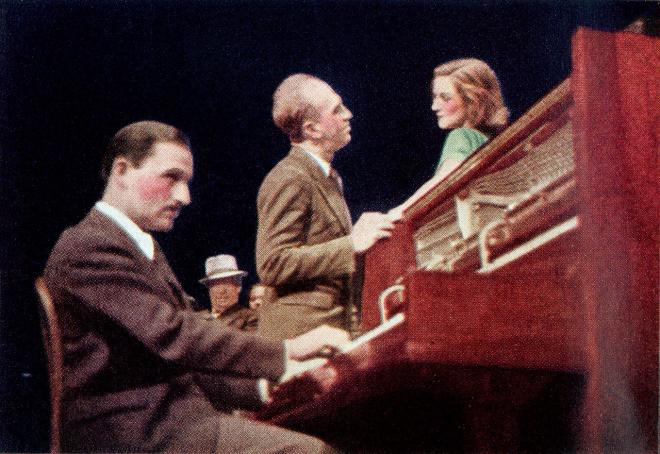The Cradle Will Rock is a 1937 play in music by Marc Blitzstein. This piece became a thundering work of American history when governments and unions alike tried to ban its legendary first performance. It is almost entirely sung-through, giving it many operatic qualities, although Blitzstein included popular song styles of the time. Artistic Director of IN Series, Timothy Nelson, shares the history, impact, and musical elements of this historical work ahead of IN Series' production in October.
Marc Blitzstein’s “The Cradle Will Rock”, written in 1936 at the height of the Great Depression, is one of the most original and important works of American theater and music ever written, and is also one of the least known. Uniquely, the story of the works creation, censorship, and premiere performance has largely eclipsed exposure to the work itself, becoming one of the essential stories of Americana.
Blitzstein, along with director Orson Welles, had been seeking unsuccessfully for producers for what would have been a large-scale spectacle production by the time he accompanied his own solo performance of it in a hearing for Federal Theatre Project director Hallie Flannigan at the apartment shared by producer John Houseman and composer and critic Virgil Thompson. Flannigan took to the piece immediately, connecting with its unapologetically populist and progressive themes, and noting Blitzstein’s particular force of genius. Hallie Flannigan would later record that she didn’t see why the piece needed much set, costume, production at all. The Federal Theatre Project, having already produced notorious works by the young Welles (Voodoo Macbeth, Dr Faustus), took up the call to produce “The Cradle Will Rock” in June of 1937 in New York City.
Word came, just weeks before the scheduled preview performances that congress demanded 30% cuts from the Federal Theatre Project’s New York division budget. Hallie Flannigon would later note that as The Cradle Will Rock was the only work being produced that June, it was clearly an attempt by the federal government to censor a work whose celebration of the working man and skepticism of unrestrained capitalist greed challenged conservative bureaucratic strains in Washington. Unfortunately, the FTP was uniquely able to employ musicians and actors at reduced standard rates, and the musicians union refused to allow their artists to perform unless paid the full fee, impossible in 1930s America. At the same time the actors union also refused to allow any of their artists to perform the work on any stage in New York without the permission of the works original producers, in this case the federal government, which would offer no such blessing. After a day of chaotic maneuvering - which included finding a new theater, and driving a loaned piano from a local boarding house continuously around the block until a new theater could be found - a new performance was slated with Blitzstein himself performing the piece from the piano, alone on the stage of the Venice Theater. The audience, which was already a sold-out crowd, expanded and over-filled the theater having heard of the dramatics. As Blitzstein began reading the staging directions and playing and singing all the roles, artists from the cast that were seated in the audience began to sing from the house. Their union had only forbade them, ironically, from performing on the stage. The entirety of the show was performed this way. An iconic American theatrical moment was born, history was made, and The Cradle Will Rock is almost always performed this way, the way Hallie Flannigan thought would actually serve best.
In this breathtaking true story, it is easy to lose sight of the fact the The Cradle Will Rock is a supreme artistic achievement. It arises at a precise moment born of the dance between two essentially bound and yet totally different cultural paradigms. Marc Blitzstein exemplifies this. Blitzstein was Jewish-American born in Philadelphia. He was not only steeped in American music, dance, innovation, thought, but also, much like the French playwright and artist Jean Genet, gravitated towards the rawest forms of American social expression - prostitutes, convicts, sailors, criminals (later made immortal in Blitzstein’s translation of Kurt Weill’s Die Dreigroschenoper as The Threepenny Opera, which contained that classic flame to Blitzstein’s moth, Mack the Knife). Blitzstein did not perform Americana - dance rhythms, jazz, popular styles and language - in the way his contemporaries (and sometimes friends) Aaron Copland and Leonard Bernstein did - he lived his own sound and vernacular. At the same time, Blitzstein was drawn to early twentieth century musical-theatrical innovations of Europe. He studied briefly with Arnold Schoenberg, with whom he had a contentious relationship but ultimately came to admire, and with Nadia Boulanger, sister of Lili Boulanger, in Paris, like Bernstein and Copland and so many others (it continues to be ironic that the iconic sounds of America in music actually came from the classroom of this famed French female pedagogue). More importantly, Blitzstein came in contact with the creations of Bertolt Brecht and Kurt Weill. Not unlike his relationship with Schoenberg, Blitzstein was critical of Weill’s “selling out” to a popular sound (Weill certainly put on the sound of German cabaret, as Bernstein did that of the mambo), but came to respect him deeply, in particular his theories on musical drama-making, during rehearsal for the 1936 musical Johnny Johnson. Although the influence of Weill in the piece is unmistakable, it was Brecht that heard the early sketches of The Cradle Will Rock, and convinced Blitzstein to expand the piece into a full opera (Blizstein rightly insisted on calling the piece an opera) that explored all forms of prostitution - literal, moral, spiritual, professional. The Cradle Will Rock is dedicated to Brecht.
It is precisely in the synthesis, however unconscious, of these two influences that the genius of The Cradle Will Rock sits, and is how it achieves something surpassing both the American musical comedies of the day, as well as the theater collaborations of Brecht and Weill. The Cradle Will Rock is composed less than ten years after the premiere of Jerome Kern and Oscar Hammerstein’s Show Boat, a work credited with inventing the American musical. The path the Show Boat opened was seismic. Until then, and even in the years immediately following, musical theater in America was largely light and comedic, often in the follies and sometimes even pastiche form, without emphasis on narrative storytelling. Show Boat pointed to the potential power and unique Americanness of the artform, and paved the way for the works of Rogers and Hammerstein, Lerner and Lowe, and similar masterpieces of popular song giving weight to dramatically meaningful narratives. The Cradle Will Rock did something else, showing the possibility of working within the genre to innovate, provoke, critique, and even alienate and disturb. This is the path of works later trod by Cabaret, Merrily We Roll Along, Follies, and Candide.
Kurt Weill, despite his entree into the New York musical theater pantheon (with works like Lost in the Stairs, Street Scene, Lady in the Dark, A Touch of Venus) never really wrote more than set-piece songs inserted, sometimes with tangential awkwardness, into a story. The brilliance of his melody, and even more his rhythm (Blitzstein said of Weill that his “music is essentially ugly because it is characterless, yet he is clever enough to keep the rhythms always going, they have push and go”) often succeeds despite this trait of his theater works. It is the same, and perhaps even more so, with Weill’s early Brecht collaborations like The Threepenny Opera, Mahagonny and Mahagonny Songspiel, or Happy Days). Blitzstein, on the other hand, knew intuitively how to write characters in the music, and to tell a story through musical atmosphere. In The Cradle Will Rock, he approaches a unique recitative form that is fully his own, and from which songs and ensembles grow organically before returning. It is a masterpiece, with an unrivaled fluidity of song and style. Also unmatched are its originality and uncompromisingly indicting wit (both thematically and poetically).
Blitzstein would go on to be a respected, if little known, composer of many forms - symphonic works, film scores, ballets, operas, piano and chamber music, and books of songs. He became deeply connected with the poetry of E.E. Cummings (one setting of Cummings is included in this performance). His career was certainly not helped when, in 1958, he testified before the House Committee on Unamerican Activities, and refused to hide his membership in the Communist Party. He had a long lasting, if tumultuous friendship, with Leonard Bernstein, who he met at a Harvard performance of The Cradle Will Rock in which Bernstein played from the piano and narrated the piece just as Blitzstein had done in 1937. Bernstein championed Blitzstein, and when Blitzstein died, Bernstein said that he felt as if he’d lost his own arm. Though Blitzstein married Eva Goldbeck in 1933, and it is Goldbeck’s death of anorexia nervosa in 1936 that threw Blitzstein into work on The Cradle Will Rock, Marc Blizstein lived most of his life as an openly gay man. Of his early closeted years, he once told his sister “it is absurd to assume that there are no sins…my sin is, has been…the willingness to corrupt my nature”. In 1964, while on a trip to Martinique, Blitzstein was murdered by three sailors he had picked up in a bar, one of whom he is said to have propositioned (this is an ending not unlike that of Claude Vivier, whose music was the center of IN Series 2022 production Requiem).
Blitzsten, from his music, to his language, to his life, and to his death, was a populist. Populism has taken a darker connotation in recent years. It is a word the left, humanists and liberals, want to reject because of the company they might then have to keep by association. The Cradle Will Rock, refuses to allow colonization of this word. It is deeply, fiercely, and joyfully, populist. It is so not only in its themes, subject matter, but also in its music, its origins, its mythology and history. It refuses to let America off the hook for not being the best version of itself, and ends with a joyous, fervent, and unfaltering call to action.
Timothy Nelson was named Artistic Director of IN Series in the Spring of 2018. Having founded and led American Opera Theater, he went on to maintain a career as director, designer, and conductor in Europe and North America, serving as Artistic Director for the Netherlands Opera Studio and the Nieuwe Stemmen program of the Rotterdam Operadagen, and creating productions for London’s Barbican, English Touring Opera, the Nationale Reisopera, Academy of Ancient Music, Iford Arts Festival, Brooklyn Academy of Music, and others. He has been called by the New York Times “The Future of Opera.” Most recently he directed an acclaimed 2021 production of Cosi fan tutte with San Diego Opera.
With IN Series he has created pioneering work that has propelled the company to regularly lead Best of... lists in media outlets of the nation’s capital. Over the course of the 2020-2021 season Nelson developed INvision, a virtual multi-venue performing arts center housing digital content created by numerous innovative opera and theater companies across America. His own work in this platform has included films of Gluck’s Orphee et Eurydice, Schumann’s Frauenliebe und Leben, and the recently released King Harald’s Saga by Judith Weir.
WETA Passport
Stream tens of thousands of hours of your PBS and local favorites with WETA Passport whenever and wherever you want. Catch up on a single episode or binge-watch full seasons before they air on TV.



